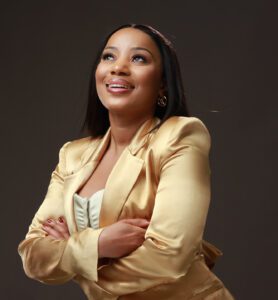
By: Robyn Nakaambo
Does the idea of public speaking seem daunting to you? Well, in a world of eight billion people you can rest assured that it is more common than you can fathom.
To those who want to overcome this hurdle, focus on how to train your mind to perceive the hurdle as a small challenge in your path to being the greatest master of ceremonies you can possibly be.
My name is Robyn Nakaambo, and I am a seasoned Namibian Master of Ceremonies with no formal public speaking training. My tale is one which demonstrates that preparation, practice, eagerness to continuously learn from others in the trade, ambition and perseverance go a long way.
Contrary to popular belief, vocabulary, tonality, image (physical appearance) and personality matter tremendously. In a nutshell, a master of ceremonies should embody the values of the person, people or company they are contracted by.
This is the importance of preparation and research as it is the fundamental note upon which a master of ceremonies ought to base the entire programme on.
How does one prepare for an event? I will not be able to give you the textbook answer to this, but here is what has been working for me for over a decade in this trade.
1. Preparation and research: Be knowledgeable about the person, people or company you are representing. There are no such things as stupid questions nor can one be over-prepared.
Take ownership of the programme and advise your contractor where need be to ensure the best desired outcome as you are the expert in your trade.
2. Prioritise learning the pronunciation of names, surnames and words within the programme. Nothing is more unpleasant than a master of ceremonies who can’t pronounce words they ought to have prepared for prior to the event. Introduce all important guests and set house rules (keeping of phones on silence and announcement of where the lavatory is situated).
3. Craft your messages accordingly for each segment of your programme. Share personal experiences or quotes that are related to the topic at hand to enhance the connection and entice engagement with your audience. Once your audience perceives you as relatable, they will let down their guard and your job will become much easier.
4. Nonverbal communication and voice projection: I had the privilege of starting my media career on radio as a presenter. Because my audience could not see me physically, I had to work ten times harder to create rapport. On radio, one learns the hard way that your looks and appearance cannot save you.
I learned to speak with a smile on my face in the hopes that my audience would hear my smile in the absence of seeing it, my voice projection needed to be audible (without shouting) and firm (tone) while exuding confidence.
A few years later I transitioned into being a master of ceremonies. I completely underestimated this as I thought it would be a walk in the park. Again, as much as I had learned about capturing an audience with my voice on radio, I learned very quickly that I had to learn how to capture them with my physical appearance and nonverbal communication skills. Dress code, eye contact, hand gestures, smiles and laughter (make jokes but don’t be offensive) needed to come into play in this regard.
Once I mastered this, I became so comfortable on stages that my transition into television was natural.
5. Maintain professional etiquette: Last but definitely not least, professional etiquette is very important as this is the precedence you set for your future job opportunities.
Never underestimate a job or your audience but rather look at each event as an opportunity or steppingstone to more jobs. Be friendly and network, I believe that an inquisitive mind is a magnet to knowledge and one can never know too much.
I hope these few pointers will assist you in channeling your inner master of ceremonies. PS: Nerves are part of the process. I still get them to date so no amount of experience will rid them, just learn how to manage them internally.
Written by: Robyn Nakaambo – Media Practitioner & Brand Strategist.









Comments